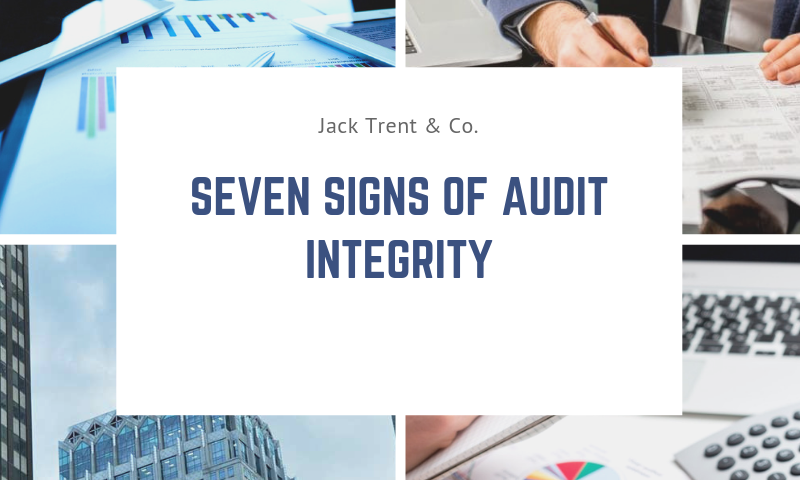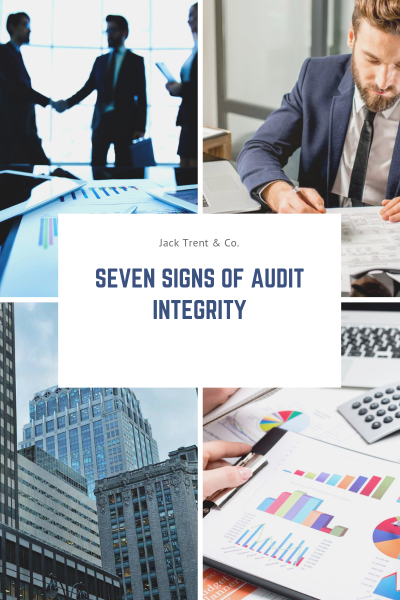Seven Signs of Audit Integrity

Seven Signs of Audit Integrity

The difference betweengood and great. We can usually tell the difference. And likewise it isin the corporate audit world. A good auditor can rattle off theaccounting policies and quality control standards. A great auditor willuse these to advocate for the success of your firm. But coming into anaudit can be very intimidating and auspicious.
If you are the CEO, CFO or on the audit committee and you need arefresher of what to look for in audit integrity or a newbie to theprocess here is a list of some high points to consider:
1.Which accountants will work directly with me?
Have you met the audit team? Do you have a bio sheet on each and everyone of them? Have you seen them face to face? Getting to know your auditteam is critical in not only having a successful audit but establishinga mood of “esprit de corp” through the process. Investing in people(building relationships) and the process can greatly increase yourbottom line.
2. Added value.
I’ve heard it once said “everyone has a sign around their neck saying make me feel important.”
It is no different in the corporate audit world. And everyone wants toknow what you bring to the table. What do you have that brings value tous? A valid point that is always at the forefront of every relationship.
3. Price.
Billing rates, startup costs, service, and all ancillary costs are allpart of the deal. Make sure you know them. All firms should includethese in the proposal. And if they don’t do not be sheepish n yourrequest for them. Also, once again, building relationships canstrengthen future savings when fees for the audit firm increase.
4. Are you peer-reviewed?
A firm’s participation in the peer-review process is another factor inthe reliability equation. Licensed certified public accounting firmsmust be peer-reviewed once every three years. Check the website of yourstate’s society of CPAs to find out if the firm has been registered.
5. Who is your typical client?
This should be more specific than a general industry category. Diversityis good. And something that should be more sought after. However,logically, it stands to reason that there will be natural tendency tolean toward one sector or another based on audit experience.
6. Size of firm?
A firm might not have enough CPAs to serve you efficiently if unlicensedprofessionals are doing much of the work. Firms with at least five CPAsare sufficient for most private companies. But efficacy of a firm isnot the sum of its parts alone. Smaller firms are often times bring morevalue to the table as their fees are lower and their focus is more ondoing a great job…… kind of like an underdog in a fight! They workwith heart and are not so much part of the big machine.
7. When can we connect?
A good working relationship starts with a good first impression. Anyfirm that is worth its weight will go to great lengths to ensure thattheir best foot is put forward. There should be much interface in thebeginning. Asking for a meeting or two will help in the stabilization ofthe relationship. And any audit firm knows this and invites this typeof behavior. Make sure you take the time to meet with them and discussyour cares and concerns before you make your decision. A 15 or 30 minuteconversation and secure the right firm.
The nuts and bolts of the whole thing:
All of the above mentioned are just some of the things to look for whenmake the decision as to which audit firm. Of course, the obvious reasonis to hire an organization to protect your best interest as a companyand protect and hopefully increase your bottom line. Of course, eachcompany has other features that, if asked they are more than happy toshare. But leading with these questions will not only guide theconversation in the right direction but will also reveal the integrityof the team. And that is truly what is at stake. The integrity of theaudit team. And with these guidelines, you will be able to know fullwell the audit integrity of your choice.
